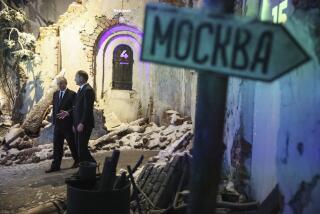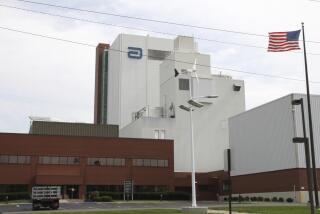U.S. Steps Up Efforts to Halt Libya Gas Plant
- Share via
WASHINGTON — The Bush Administration called Wednesday for “vigorous efforts” to stop Libya’s production of poison gas at a desert factory, and it pointedly refused to rule out military action against the regime of Col. Moammar Kadafi.
The plant “is dangerous and becoming more so,” said a statement read to reporters Wednesday morning by White House spokesman Marlin Fitzwater. “The international community,” he added, “should step up its efforts to deny Libya the ability to continue operating the plant.”
Asked several times if the United States has any plans for military action against Libya, Fitzwater refused to comment, saying only, “We don’t rule anything out.”
The concern arises from a factory in Rabta, a desert town about 60 miles south of the Libyan capital of Tripoli. The Libyans have insisted it was built to make medicines. But American officials say they have confirmed that the plant is manufacturing at least limited quantities of mustard gas and perhaps other chemical weapons.
In 1986, then-President Ronald Reagan ordered U.S. jets to bomb Tripoli in retaliation for Kadafi’s support of terrorism. But, despite the implied threat of military action against the Rabta plant, the main focus of the Bush Administration’s efforts so far appears to be an attempt to cut off the supply of chemicals needed to produce gas at the plant. In the past, the Administration has made public statements about the chemical plant to put pressure on U.S. allies to police chemical shipments to Libya.
“We want everyone to make sure that they’ve taken all precautions against (shipments to Libya) occurring,” Fitzwater said.
Libya’s potential to produce poison gas has been a major American concern for at least two years, since reports of the construction of the Rabta plant first became public. At the time, Administration officials said West German companies were deeply involved in helping build the facility.
“At that time, we received assurances from the German government that the problem was corrected.”
Now, “I don’t think we can say we know where the chemicals are coming from,” Fitzwater said, noting that there are “many routes” and that the Administration does not want to “discuss any specific countries.”
“We certainly would urge all countries to survey their internal situation, inventory their chemical productions facilities and to make their own judgments that they are not a source for any of these chemicals,” he added.
Last fall, a West German court ordered the detention of a senior official of Imhausen-Chemie, a West German chemical company that has been under investigation in connection with the Rabta plant.
Policing the international flow of chemicals that could be used to produce poisons for military purposes has proven extremely difficult. Many of the chemicals used to make nerve gases and other military toxins are also used to produce pesticides and other legal products. International chemical firms have resisted some efforts to monitor production and sales of their products, arguing that they could lose control of important trade secrets.
Mustard gas, in particular, is a relatively easy chemical to manufacture, although some experts believe the Libyan plant may be capable of producing more sophisticated nerve gases. Such gases attack the central nervous system, inhibiting breathing and usually causing a quick death. Mustard gas sears the lungs and skin, causing painful and crippling disabilities or death.
The use of mustard gas in warfare is prohibited by the 1925 Geneva Convention, adopted after the widespread use of poison gases in World War I. No treaty, however, bans the production and possession of chemicals weapons, and both the United States and the Soviet Union possess large chemical weapons stockpiles.
Many Third World nations, seeing chemical bombs as a relatively cheap weapon with great power that could be used by them--or against them--by enemies, have built plants capable of producing poison gas. U.S. experts believe that about two dozen countries now have such capability.
President Bush has proposed an international treaty to ban the weapons, and the Soviet Union has expressed support for his position. Efforts to draft a treaty, however, have been complicated by questions about how it would be policed.
Chemical weapons have been used repeatedly in recent years in conflicts between Third World nations, particularly in the Iran-Iraq War. In addition, U.S. officials worry that the chemicals could also be used by terrorist groups to attack civilian populations. Kadafi’s links with terrorists have made Libya’s production of poison gas of particular concern.
The Libyans consistently have denied that the plant is designed to produce chemical weapons, a position they reiterated Tuesday.
Jana, the Libyan news agency, quoted an unnamed Libyan Foreign Ministry official as having “disclaimed” reports that Libya had produced “quantities of chemical weapons in (the) Rabta medicine factory.”
“Such allegations aired at present by some media circles aim at creating a state of suspicion,” the agency quoted the official as saying.
More to Read
Sign up for Essential California
The most important California stories and recommendations in your inbox every morning.
You may occasionally receive promotional content from the Los Angeles Times.














